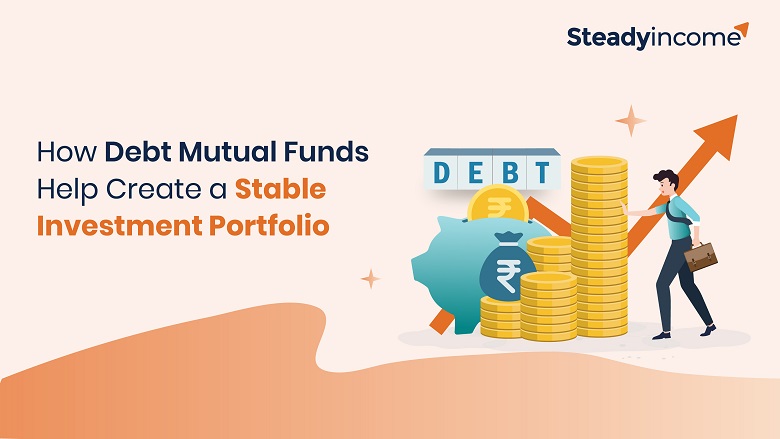How Debt Mutual Funds Help Create a Stable Investment Portfolio

What Are Debt Mutual Funds?
Debt mutual funds are investment vehicles that primarily allocate funds to fixed-income assets such as government bonds, corporate bonds, treasury bills, and money market instruments. Unlike equity mutual funds, which are influenced by stock market fluctuations, debt mutual funds prioritize stability by focusing on low-risk securities to deliver consistent returns. The primary objective of debt mutual funds is to provide investors with regular income while preserving capital, making them an attractive option for risk-averse individuals.
Advantages of Debt Mutual Funds in Portfolio Building
- Stability through Fixed Income Instruments
Debt mutual funds provide stability by investing in fixed-income securities. These investments are less volatile than equities, ensuring your portfolio remains steady even during market downturns. - Diversification across Asset Classes
including debt mutual funds in your portfolio enhances discrepancy. Diversification reduces the risk of losses by spreading investments across different asset classes such as equities, debt, and gold. - Predictable Returns
The returns from debt mutual funds are more predictable than those from equity mutual funds. By investing in securities with fixed interest payouts, debt mutual funds ensure a steady stream of income, making them ideal for conservative investors. - Liquidity
Debt mutual funds are highly liquid, allowing investors to redeem their units whenever needed. This feature is particularly useful for those requiring access to their funds during emergencies. - Tax Efficiency
Compared to traditional fixed-income instruments like fixed deposits, debt mutual funds offer better tax efficiency for investments held over three years, as they qualify for long-term capital gains tax benefits with indexation.
Debt Mutual Funds Returns: What to Expect
The returns from debt mutual funds depend on factors such as the type of fund, the interest rate environment, and the credit quality of the underlying securities. While they may not offer the same high returns as equities, debt mutual funds provide consistent returns, making them a reliable choice for achieving financial goals.
In India, debt mutual funds typically offer annualized returns ranging from 6% to 9%, depending on the fund type and market conditions. The highest return debt mutual funds often invest in longer-duration securities or high-yield corporate bonds, albeit with slightly higher risk.
Types of Debt Mutual Funds
To create a stable portfolio, it’s important to choose the right type of debt mutual fund based on your risk tolerance and financial goals.
-
Liquid Funds
- Invest in short-term instruments like treasury bills and certificates of deposit.
- Suitable for investors seeking low-risk and high liquidity.
-
Short-Term Debt Funds
- Focus on securities with a maturity of 1 to 3 years.
- Ideal for investors looking for stability and better returns than savings accounts.
-
Corporate Bond Funds
- Invest in high-rated corporate bonds.
- Offer slightly higher returns with moderate risk.
-
Gilt Funds
- Invest in government securities with minimal credit risk.
- Suitable for risk-averse investors.
-
Dynamic Bond Funds
- Adjust the portfolio based on interest rate movements.
- Ideal for investors willing to accept moderate risk for potentially higher returns.
Debt Mutual Funds in India: Why They Are Popular
Debt mutual funds in India have gained traction due to their flexibility, tax benefits, and ability to generate steady income. With a range of options available, investors can choose funds that align with their goals, risk appetite, and investment horizon.
Investors looking for the best debt mutual funds in India 2024 should focus on funds with a strong track record, high credit quality of underlying securities, and consistent performance across different market cycles.
How to Choose the Best Debt Mutual Funds in India 2024
When selecting a debt mutual fund, consider the following factors:
-
Investment Objective
Match the fund’s objective with your financial goals. For instance, if you need high liquidity, a liquid fund is a better option. -
Credit Quality
Evaluate the credit rating of the fund’s investments. High-rated securities offer lower risk and consistent returns. -
Duration
Choose funds with a duration that aligns with your investment horizon. Long-term funds may offer higher returns but come with interest rate risks. -
Past Performance
Analyze the fund’s historical performance. While past performance doesn’t guarantee future results, it provides insights into how the fund performs under different market conditions. -
Expense Ratio
a lower expense ratio ensures that a larger portion of your returns remains with you.
Steps to Build a Stable Portfolio with Debt Mutual Funds
-
Assess Your Risk Profile
Determine your risk tolerance and allocate a portion of your portfolio to debt mutual funds accordingly. -
Diversify across Fund Types
Invest in a mix of liquid funds, corporate bond funds, and gold-plated funds to spread risk and improve returns. -
Monitor Interest Rate Movements
Interest rates impact the performance of debt funds. For instance, falling rates benefit long-duration funds. Stay updated and adjust your investments accordingly. -
Set Clear Goals
define your financial goals—whether it’s saving for emergencies, generating regular income, or preserving capital—and select funds that align with these goals.
Who Should Invest in Debt Mutual Funds?
Debt mutual funds are ideal for:
- Conservative Investors: Those seeking stable and low-risk returns.
- Short-Term Goals: Investors with a horizon of 1 to 3 years.
- Diversification Seekers: Individuals looking to reduce risk in an equity-heavy portfolio.
Conclusion
Debt mutual funds play a crucial role in creating a stable investment portfolio by offering consistent returns, low risk, and diversification benefits. With options ranging from liquid funds to dynamic bond funds, investors can choose products tailored to their financial objectives.
By including debt mutual funds in your investment strategy, you can achieve a balance between growth and stability, ensuring long-term financial security. For those looking for the best debt mutual funds in India 2024, conducting thorough research and consulting financial advisors can help make informed decisions.

